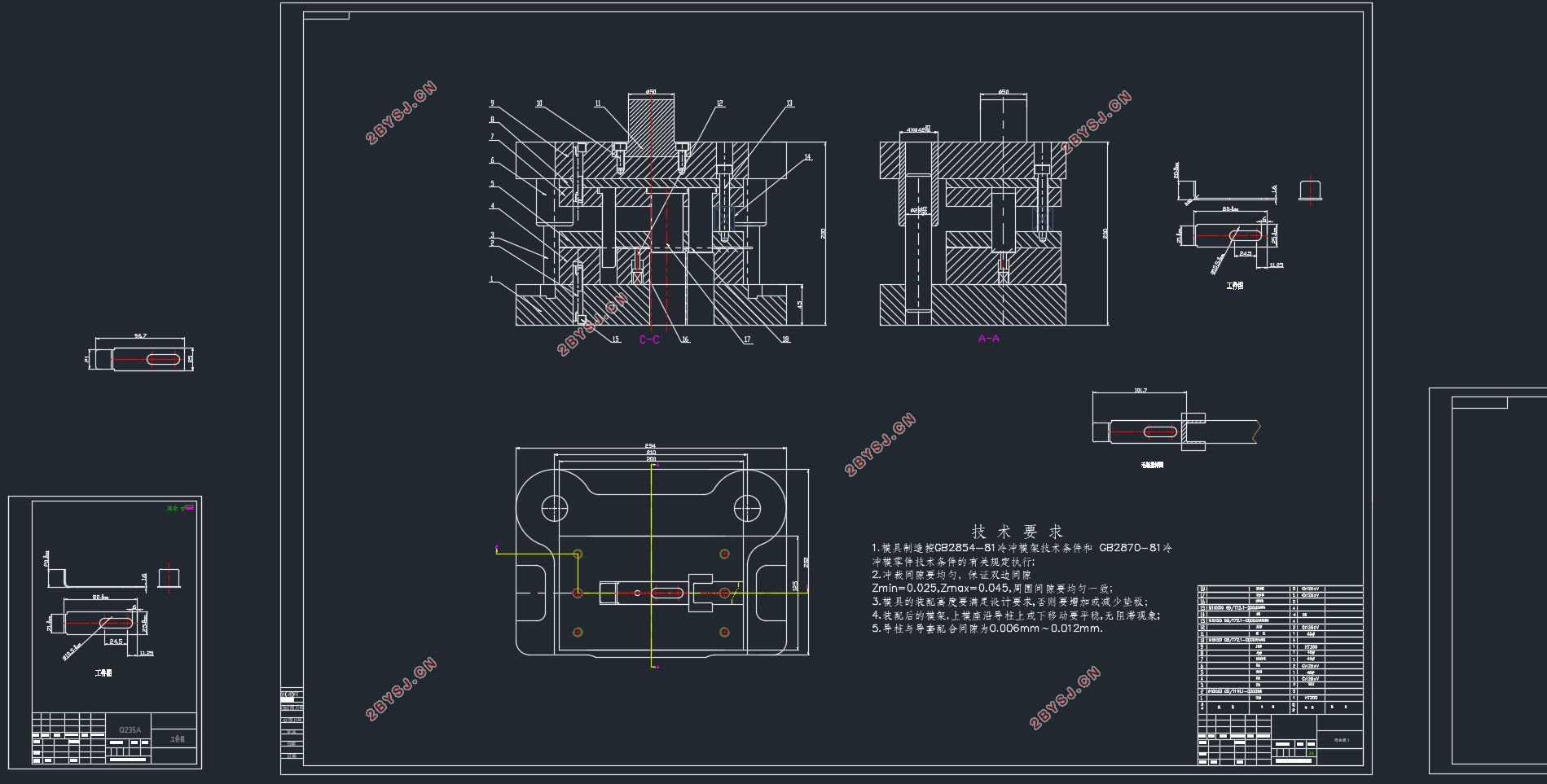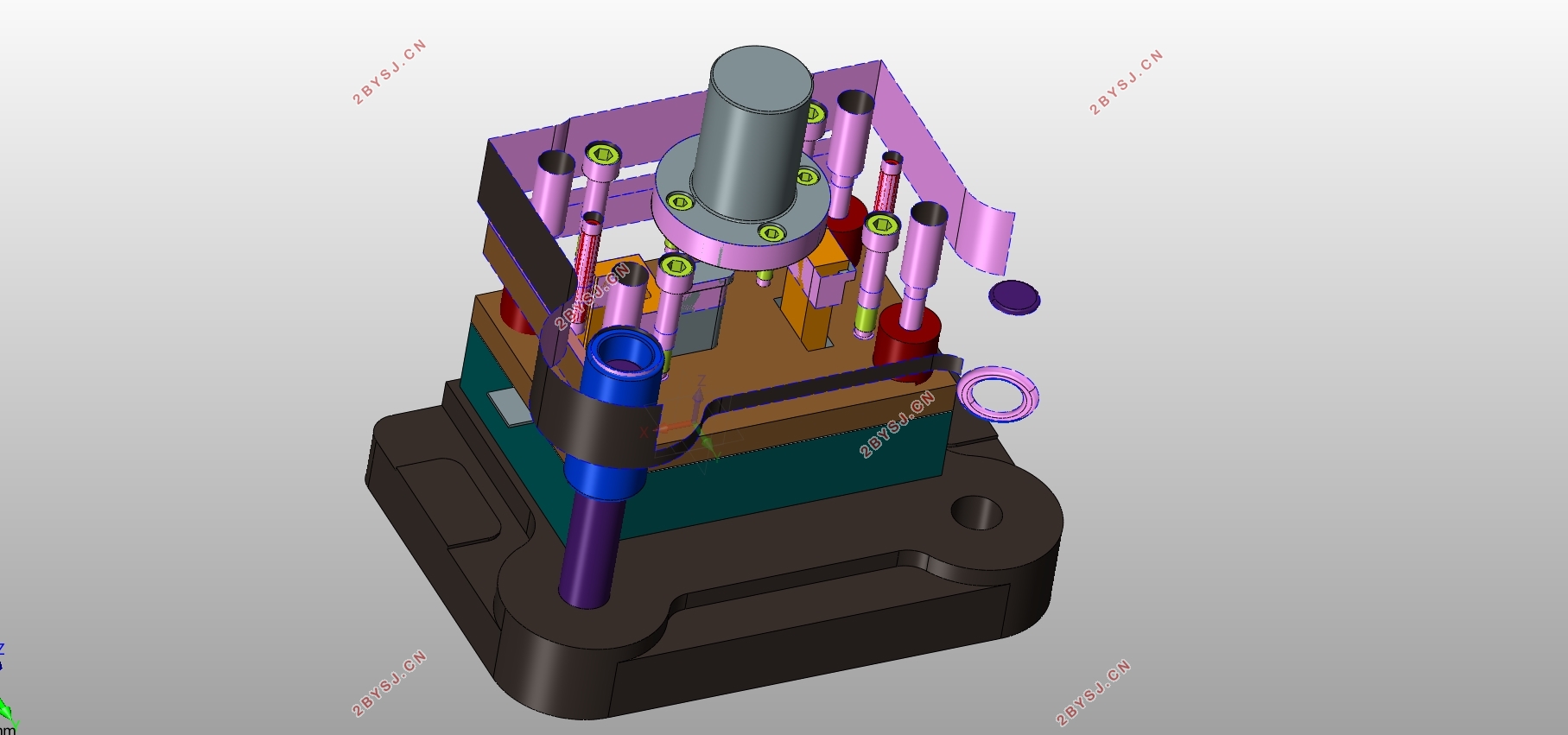T型支架成型工艺与冲压模具设计(含CAD零件图装配图,UG三维图)
无需注册登录,支付后按照提示操作即可获取该资料.
T型支架成型工艺与冲压模具设计(含CAD零件图装配图,UG三维图)(论文说明书11000字,CAD图10张,UG三维装配图)
摘要
模具是现代工业生产中的重要工艺设备,它是一种由工具组成的塑性变形过程。模具生产技术水平的先进程度,早已作为衡量一个国家机械生产制造水平是高还是低的重要指标之一。本次的模具设计题目为冲压模具设计,作为模具行业中占比较重的类型,充裕是由板料或者条料通过模具的作用下产生变形从而得到想要的产品,而由冲压产生变形的类型又分为冲裁,拉伸,以及成形等等。
首先我们需要先对题目的T型支架零件进行初步的分析,分析其材料工艺性以及成型的性能,判断该零件的材料以及成型方式是否能够满足此次冲压的要求。然后针对该零件所需的冲裁工序,比如落料工序、冲孔,弯曲工序等,确定出最为合理的,最具有经济性以及最为方便加工的模具冲裁方案,比如复合模或者级进模等等。然后通过对零件进行排样图设计,排样图的设计作为冲压模具设计的重点,就好比是建筑行业的地基一般,整个冲压模具的设计都会围绕到排样图的设计,所以这一块将是本次设计的重点内容。在排样图设计完成之后,根据确定的模具冲裁方式,进行凹模,凸模,卸料板,固定板等模具零件的设计。然后将进行凸凹模刃口尺寸的计算,以及模具所需的冲压力,针对计算出的冲压力给本套模具选择合适的压力机,最后对本次设计工作进行总结。
关键词:模具设计; 冲裁件分型;结构;图纸; 凸模 ;凹模
Forming technology and stamping die design of t-type bracket
Abstract:
Die Is an important process equipment in modern industrial production. It is a plastic deformation process composed of tools. The advanced level of mould production technology has long been one of the important indexes to measure whether a country's machinery production level is high or low. The theme of this Die Design is stamping die design, as a relatively heavy type of die industry, abundant is by the role of the sheet or strip material through the mold to produce deformation to get the desired product, the types of deformation produced by stamping can be divided into blanking, stretching, forming and so on.
First of all, we need to make a preliminary analysis of the topic of the car floor connector parts, analyze its material technology and molding performance, determine the parts of the materials and molding methods can meet the requirements of the stamping. Then, according to the blanking process, such as blanking process, piercing process, trimming process and drawing process, the most reasonable, economical and convenient blanking scheme for the die is determined, like compound or progressive modules and so on. Then through the parts layout design, layout design as the focus of stamping die design, just like the foundation of the construction industry in general, the entire stamping die design will be around the layout design, so this piece will be the focus of this design. After the layout design is completed, according to the established die blanking mode, die, punch, discharge plate, fixed plate and other die parts design. Then we will calculate the size of punch and die edge, and the stamping force needed by the die. According to the calculated stamping force, we choose the right press for the die. Finally, we summarize the design work.
Key words: Die design; Blanking part parting; Structure; Drawing; Punch; Die;
2.1T型支架零件分析
本次设计,首先到二维软件画出汽T型支架的二维图,工件的厚度为1.6mm,选择的材料为Q235-A,零件外形尺寸如下图所示。
尺寸分析:零件图2-1尺寸分析后得到,零件基本没有公差,按一般的设计,设计选择的加工精度为IT12级。
结构分析:通过零件图纸知道产品有弯曲,中间一出弯曲,设计过程可以考虑先切出外形后,实现弯曲,可以采用几次工序配合完成。






目 录 1
第一章 绪论 3
第二章 T型支架冲压工艺分析 5
2.1T型支架零件分析 5
2.2冲压件材料特性 5
2.4确定冲裁工艺方案 6
第三章 T型支架工艺方案的设计 7
3.1 毛坯尺寸参数的计算 7
3.2 排样设计 8
3.2.1排样原则和注意事项 8
3.2.2 条料的宽度与步距 9
第四章 模具的工艺计算 10
4.1 压力的计算 10
4.1.1冲裁力的计算 10
4.1.2弯曲力的计算 11
4.1.3 模具的总冲压力 12
4.2 冲裁模压力中心计算 12
4.3 冲压设备的选取 13
4.4 冲裁间隙 14
4.4.1 冲裁间隙分类 14
4.4.2 间隙值和确定间隙方法 14
4.5 刃口尺寸计算 15
4.5.1 刃口尺寸计算准则 15
4.5.2计算凸、凹模刃口的尺寸 15
第五章 模具及零件设计与选用 17
5.1模具主要零件 17
5.1.1凹模设计 17
5.1.2凸模设计 19
5.2 模架和模座的选择 20
5.3垫板的选用 20
5.4卸料机构的设计 20
5.5定位零件的设计 21
5.6弹性元件的选用 21
5.7卸料板 21
第六章 压力机的校核 23
6.1 压力机的压力的校核 23
6.2 压力机的滑块的行程校核 23
6.3 压力机的行程次数 23
6.4 滑块模柄孔尺寸 23
6.5 模具的闭合高度 23
第七章 模具的总体结构设计 25
7.1装配图 25
7.2工作过程 26
总结 27
参考文献 28
致谢 30
